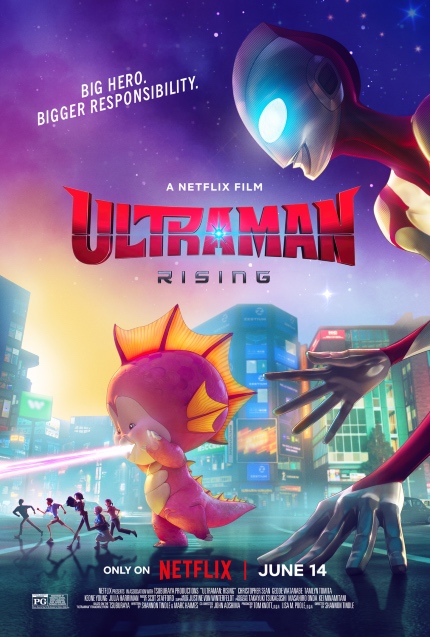ULTRAMAN: RISING Review: Netflix Brings an Oversized Superhero to the Small Screen

Parenting is hard. Parenting a 20-foot tall, rambunctiously temperamental kaiju toddler speeds right past hard and straight into impossible territory.
It’s all the more difficult when you already split your time between saving Japan from an influx of unwanted kaiju visitors as an oversized, super-powered superhero and playing professionally in Japan’s top-level baseball league. In a nutshell, the preceding sentence summarizes the central conflict driving writer-director Shannon Tindale’s (Lost Ollie, Kubo and the Two Strings, Foster's Home for Imaginary Friends) family-oriented CG-animated adventure, Ultraman: Rising.
A straight-to-streaming adaptation of Japan’s second biggest, multi-billion-dollar cultural export (Godzilla indisputably rules in that regard), Ultraman: Rising centers on Ken Sato (voiced by Christopher Sean in the English dub), a superstar baseball player who’s returned to his native Japan after a successful stint with the Los Angeles Dodgers.
Shrouded in mystery and rumor, Ken’s return has less to do with playing for the Yomiuri Giants of the Central League than fulfilling a longtime family obligation and permanently replacing his long-estranged father as Ultraman, Japan’s first, often last, line of defense against rampaging kaiju. Bitter, resentful, and egotistical, Ken represents everything a self-sacrificing superhero isn’t, but that doesn’t stop him from dropping everything at a moment’s notice, becoming Ultraman, and defending Japan against kaiju.
As it turns out, though, rampaging kaiju isn’t the problem; the Kaiju Defense Force (KDF) takes that spot, forcing Ken to become a kaiju defender when the KDF targets a lone flying kaiju. Before Ken can stop the KDF, they throw everything at the kaiju, Gigantron, resulting in the kaiju’s demise, leaving Ken in his Ultraman form to inadvertently take possession of an egg-like object.
Once said egg-like object hatches, Ken just as inadvertently becomes a surrogate father to the kaiju’s newly born offspring, an adorable 20-foot kaiju with an insatiable appetite for fish, an indomitably inquisitive nature, and much to Ken's frustration, repeated bouts of destruction-causing indigestion.
Ultraman: Rising fully exploits the comic possibilities inherent in Ken, both in regular-sized human and towering Ultraman form, juggling the baby kaiju’s (later dubbed “Emi”) seemingly inexhaustible needs, keeping her safe from the KDF's nefarious clutches, and helping his new team climb the standings and win a league title. Not surprisingly, prioritizing Emi over the rest of his life has a cost, specifically his professional one. Ken’s batting numbers dwindle, his overall play suffers, and he faces the possibility of being traded to a lesser-division rival.
All of that, of course, contributes to Ken’s internal growth from selfish, entitled, and narcissistic to the exact opposite by the film’s end. Ken’s parenting also gives him much-needed perspective on his recently retired, ex-superhero father, Professor Sato (Gedde Watanabe), and his father’s decades-old decision to send Ken and his late mother, Emiko (Tamlyn Tomita), to the United States to keep them safe. (Presumably, kaiju only attack Japan, leaving the other side of the Pacific Ocean free and clear.)
For the bespeckled elder Sato, sending Ken away to America two decades earlier allowed him to fully embrace his Ultraman identity and keep Japan safe from kaiju attacks. For Ken, being sent away to America led to unresolved disappointment with his father's seemingly selfish choices (i.e., choosing the superhero life over his family).
Working from a screenplay co-written with Marc Haimes, Tindle sidesteps Ultraman's origin story except to suggest Ken, like his father and likely his grandfather, somehow inherited his unique superpowers along with a super-secret, high-tech underground bunker. In media going back almost six decades, Ultraman's origin story has tended toward the complex and convoluted. Given the kid-friendly nature of Ultraman: Rising, it was probably best to skip it altogether and keep the story focused on the new Ultraman, adjusting to life as a superhero, and his conflicted relationship with his father, and leave it there.
All too often, Ultraman: Rising, however, hits its family-oriented themes a little too hard, but it’s offset by the unironic earnestness with which it delivers those themes. Add to that sleekly designed visuals, well-choreographed, easy-to-follow set pieces, and inspirations lightly drawn from anime, manga, and cultural imports (e.g., Guillermo del Toro’s Pacific Rim series), and the result will, if nothing else, create an entirely new set of fans eager to take a deep dive into Ultraman’s cross-media iterations.
Ultraman: Rising will be available to stream on Friday, June 14, via Netflix.
Ultraman: Rising
Director(s)
- Shannon Tindle
- John Aoshima
Writer(s)
- Marc Haimes
- Shannon Tindle
Cast
- Tamlyn Tomita
- Gedde Watanabe
- Keone Young







